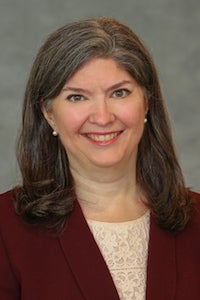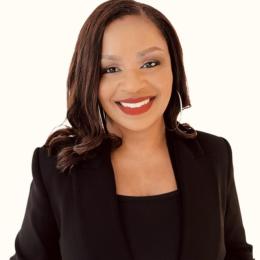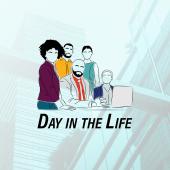
Rose Marie Glazer, vice president, deputy general counsel, and corporate secretary of American International Group (AIG), has some advice for in-house counsel who may not always be invited to executive table: invite yourself. And for those who aspire to advanced roles within (or outside of) the legal department, she says to have a plan, but to also embrace the twists and turns that life will undoubtedly throw your way. In this Q&A with the EiC, Rose Marie discusses these issues and more, including the role of legal operations, the importance of mentoring the next generation of in-house counsel, and the impact that legal departments can have on promoting diversity in the legal profession.
Background and career
ACC: Where did you attend school and what was your first job after law school?
Rose Marie: I attended Southern Methodist University in Dallas both for undergraduate and law school. The first job I had coming out of law school was with the law firm Jones Day, and I was an associate in their Dallas office. I had an internship with the managing partner of Jones Day before I actually went to law school, and ended up working with them every summer. After law school, they extended an offer to join the firm in their corporate practice.

ACC: Did you always want to be a lawyer?
Rose Marie: My mother likes to say that when people would ask me what I wanted to be, beginning as early as first grade, I always said I wanted to be a lawyer. And she’s still trying to figure out to this day how I even knew the word “lawyer” much less what a lawyer did because there were no lawyers in our immediate family.
ACC: What sparked your interest in in-house practice? Was AIG your first in-house position?
Rose Marie: No. I’ve had quite a varied career before I arrived at AIG. One of my undergraduate degrees was in accounting, so I always knew I wanted to practice in the corporate side of law. I wasn’t too big into the courtroom litigation concept. When I worked at Jones Day, I was there for six years, I had the benefit of getting to know a couple of corporate clients very well, and I found what I enjoyed the most about those assignments was being able to peek behind the curtain a bit. What were their issues, what were they trying to do to solve those issues, and why were they engaging Jones Day? I really enjoyed those assignments, and that’s when I started to think about going in-house.
That’s what I missed being at the law firm; you didn’t often get to hear the rest of the story. You focused on your assignment, you worked on the execution, but you didn’t hear the follow-up. What happened? Was it successful? Did it work the way we intended? Did it yield the results that they wanted? What didn’t work that we could incorporate and make sure we do better the next time? It was that desire to be part of the entire life cycle of a transaction that drove me to go in-house.
“That’s what I missed being at the law firm; you didn’t often get to hear the rest of the story.”
ACC: As VP, deputy GC and corporate secretary, tasked with overseeing corporate securities, M&A, and more, what does your typical day in the office look like?
Rose Marie: There is no typical day! And that is what I really love about my job — the fact that no two days are the same. I come in and it doesn’t matter what’s on my to-do list; I’m pretty confident that I’ll have no idea at the beginning of the day how my day will end. Because of the position I hold here at AIG, I work with so many different departments at the company. I work with corporate development and strategy, finance, treasury, tax, executive compensation, communications, marketing, investor relations, real estate, and administrative services. And then, the biggest client of all is the board of directors. At any point during a month, a week, or even a day, I may hear from some or all of those groups on the various initiatives they’ve got going on, and part of my job is to help them on their individual tasks. However, I also to have look at the bigger picture and make sure everybody’s talking to each other.
ACC: Do you have a legal operations team/ function there at AIG that assists with the above, and if so, how is that team integrated into the legal department as a whole?
Rose Marie: I have a great team that helps me in managing the responsibilities of what I call my “corporate hat.” At the moment I’m also the interim director of the legal operation group for the AIG legal department. The team is comprised of a lot of non-attorney professionals, focused on technology enablement, the operations aspects of our department, and ensuring that we are looking at ourselves almost as a mini business and not just as a legal function within a bigger company.
ACC: What’s the one thing about your job that’s most challenging, and on the flip side, the most rewarding?
Rose Marie: In my current role, the most challenging aspect of the position is that this is a new industry for me. I’ve not worked in the insurance and/ or financial services industry previously, and I’m learning it is a unique field that has its quirks and nuances and so, so many acronyms! Therefore, I have to learn the context for providing the legal advice that I give, while also delivering on that advice on a timely basis. I’ve been fortunate that my colleagues are helping me learn on the job. This is an area where I’ve leveraged our outside counsel to give me tutorials on the industry and the unique legal concepts within insurance, as well as our accounting firm, which has been great at helping me understand the numbers and how the decisions that we make influence the numbers within an insurance company’s P&L statement. That’s been the most challenging for me, and I suspect will be for a while, having to learn this whole new context for delivering what I do know, which is corporate securities and M&A law.
The most rewarding is the fact that I joined a company like AIG at a time when it is making a monumental strategy shift. With a new CEO, a new COO, a new GC, and a very dynamic board, there comes a new approach for helping the company to succeed, and in my role I have a seat at the table. I’m part of the group helping to define the new strategy and then helping to determine how we execute on that strategy. It’s amazing to be part of a company at this new stage of its life cycle.
“It’s really as much up to the executives to be receptive to engaging the lawyers on something more than just the legal topics, as it is on the counsel themselves to invite themselves to the meetings if they’re not already in the room.”
ACC: Speaking of your seat at the table, ACC continues to advocate for the GC’s seat at the executive table, as well as access to the board of directors. How important is it for the general counsel to have this seat, and what does it say about an organization who doesn’t invite their GC to the table?
Rose Marie: I think they are missing a critical perspective in driving decision-making. It’s really as much up to the executives to be receptive to engaging the lawyers on something more than just the legal topics, as it is on the counsel themselves to invite themselves to the meetings if they’re not already in the room. I don’t want to confess how many times I’ve invited myself to meetings where I wasn’t on the invitation list, but one of the things I’ve learned is I wasn’t excluded. It wasn’t that somebody made a deliberate decision not to include me in the meeting. It was more nobody thought to include me. And so, when I raise my hand, very rarely do people say, “No, you can’t come.” Then, if you get into the room and you prove yourself — meaning that you contribute positively to the conversation, not just talking to be heard but actually talking to contribute — what you’ll find is that people will then start to want to have you in their meetings.
ACC: You’ve held GC positions, as well as compliance based roles and more, which have likely given you a unique view on the evolution of the profession. In your opinion, what has led to the “evolution of in-house counsel?” And further, what’s next?
Rose Marie: During the last two decades, there is no question that the role of in-house counsel has shifted from being one of a captive legal adviser to becoming a legal business partner. Companies that are looking to be solution oriented now expect the lawyers to be at the table. This idea of lawyers being the “department of no” is gone. Companies who are successful view the lawyers as the means of getting to yes. And, lawyers now have to be proactive if they’re going to meet the expectations of their business partners. You can’t wait for them to come to you with a problem. You have to look ahead and identify the potential pitfalls that are coming, and give detour suggestions on how not to fall into the hole, as well as build the bridges that help the business move forward. We have to use all our abilities, not just our knowledge of the law. One of the most interesting attributes about an in-house department in today’s business environment –– and it doesn’t matter size, you can be a department of one or a department of hundreds –– is the capability to intersect with all these different functions and departments.
One of the ways I can be effective is by being what I call an old-fashioned switchboard operator, where I connect different groups with each other because I interact with all of them. I’m talking to each of them, but they may not be talking to each other. An effective in-house counsel does exactly that: they connect people who might be working on similar tasks in isolation and put them together so that they can collaborate and coordinate their efforts to yield an even better result.
"Companies that are looking to be solution oriented now expect the lawyers to be at the table. This idea of lawyers being the “department of no” is gone. Companies who are successful view the lawyers as the means of getting to yes."
ACC: What about the evolution of women working within the legal profession? Is this an area where in-house legal departments and firms are making strides?
Rose Marie: I’ve seen a lot of change since I came out of law school. When I first started in the profession, and I can only speak from my personal experience, I encountered law firm leadership that questioned your commitment and dedication to the firm and the profession if you mentioned that you were ready and wanting to start a family. The view was those two concepts did not co-exist. What I’ve seen since is firms starting to broaden their view of what constitutes a dedicated professional. I also see women more willing to push back on this behavior and to call people out and say, “Wait a minute. You’re not treating me the same as you’re treating my male coworker. He gets kudos for just having had a baby and I get punished because I also chose to have a family?” It’s important to continue, as women, to push back on that kind of stereotypical behavior, to challenge the status quo, but more importantly to mentor the new generation of lawyers. We have to support them in challenging the status quo and feeling confident and emboldened to embrace their personal choices, without having to make career sacrifices in the process.

ACC: Do you have any mentor relationships yourself, and does AIG have a mentorship program?
Rose Marie: AIG encourages our lawyers, and not just the lawyers, but all departments, to have mentors and to create impactful mentor-mentee relationships. Mentoring is as powerful for the recipient as it is for the person acting as the mentor. I’ve actually learned from my mentees more than I feel I ever imparted to them because they keep me grounded. They remind me of the challenges we face and ensure that I’m keeping an open perspective in the way that I’m leading my own team based on their experiences and observations.
“It’s important to continue, as women, to push back on that kind of stereotypical behavior, to challenge the status quo, but more importantly to mentor the new generation of lawyers.”
ACC: How can in-house counsel contribute to advancing diversity within the profession?
Rose Marie: I think they have a huge role to play, and it comes in a couple of ways. One, we have a tremendous amount of influence over how our matters are staffed. So, if we make clear to the law firms our expectations about the makeup of the teams that are advising us, we can positively influence diversity and inclusion in the law firms that we use. Another way we have a role is we have to walk the talk, both in our own hiring practices and the way that we are representing the diversity of our communities in our workforces, but also in the way that we engage with firms — only using firms that we believe are living our diversity and inclusion beliefs and values. And then, the last is going back to the mentor concept — we have to mentor the new generation of lawyers to reshape and redefine expectations to ensure that they become a resilient part of the fabric of our society.
ACC: What advice do you have for those aspiring to the role of general counsel?
Rose Marie: One of the things I learned very early in my life is people love to talk about themselves, and when I aspire to a different position or I’m in a new department or a new company, being an active listener and asking questions is the most effective way to begin to learn about the culture and dynamics of the community you’re joining. A typical in-house legal department is a notoriously flat organization and people often mistake management positions as being the only opportunity for advancement. In-house lawyers should also consider advancement through increased responsibility, even their individual contributor roles.
The key to progression is to talk to people, to network both within your own company and within communities of like-minded professionals. For example, in the corporate secretary space, there are several societies for corporate governance professionals that I would encourage people who are interested in that aspect of this profession to join. There, they can talk to members about how they got to their positions, what they do, what makes them successful, who their key stakeholders are, how they get close to those stakeholders, and how they bring value adds to the company in their roles. Because ultimately that is what’s going to bring you notice and facilitate success going forward. This is the ultimate apprenticeship profession. It’s all about who you get to know and learning from them, so that you can benefit from their wisdom as well as from their mistakes so that you do not repeat them.
"This is the ultimate apprenticeship profession. It’s all about who you get to know and learning from them, so that you can benefit from their wisdom as well as from their mistakes so that you do not repeat them."
ACC: What does the future of in-house practice look like and how does technology play a role?
Rose Marie: I firmly believe that technology plays an important role in the future of in-house practice. One thing that will always be true is in-house departments’ struggle with having enough budget and resources. That’s just the nature of being in a company. We all have that problem and that challenge. Technology is an essential way to extend our resources.
To me, technology is a way that we can focus the efforts of high-value human resources on complex, subjective challenges. For example, we can leverage technology to handle repetitive tasks and to provide some self-service offerings. Further, we need to use technology to catalog and mine the reams of data that are part and parcel of our job. That includes using technology to more effectively do research, find and manage our documents, and to be able to ensure that we aren’t reinventing the wheel. In other words, how are we leveraging the work product that we’ve produced previously so that we’re improving on it, and not just constantly reinventing the same exact model over and over again?
"Not every path forward is necessarily a straight one that goes ahead. Sometimes you need to go to the side, or you may even need to step back in order to actually leap forward."
ACC: Parting words of advice?
Rose Marie: What I tend to tell people, especially the younger lawyers that I talk to, is nobody’s going to be as effective an advocate for them in their career as themselves. They are the most vested in their own success. I challenge people to raise their hand and seek out opportunities that look interesting to them, and to not wait for people to seek them out. This requires having a vision of where they want to go. Where do they see themselves in five or 10 years, and how is what they’re doing today contributing to getting them to their final destination, or at least their next interim destination?
But I always caveat my advice by saying that, while you have to have that clear vision, you also have to be open to life’s right turns. Not every path forward is necessarily a straight one that goes ahead. Sometimes you need to go to the side, or you may even need to step back in order to actually leap forward.
Getting to know… Rose Marie Glazer
What's one piece of advice would you give your younger self?
One of the things I often remind myself is to have patience. There is no timetable for life’s milestones. I’m a cancer survivor and one of the things that has hit home for me is that often we don’t stop and enjoy the here and now, the moment that we’re in. We’re so busy trying to look ahead to see where else we want to go that we don’t stop and say, “You know what, this is pretty good, right here and right now.” We don’t savor what we have achieved before we get back on the crazy carousel reaching for that elusive brass ring. That’s one thing I wish I had learned a lot earlier in life.




